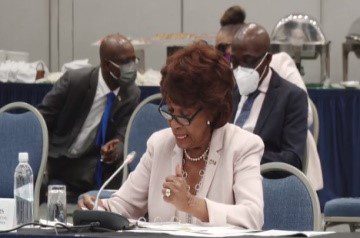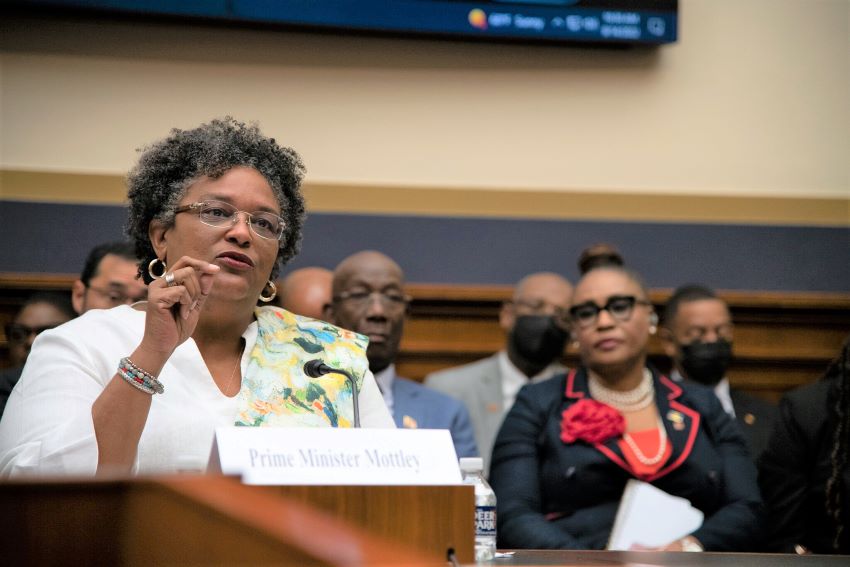Caribbean leaders met with a delegation from the United States House Committee on Financial Service aimed at reversing the damage caused by decades of loss of corresponding banking, de-risking and deteriorating financial access.
Congresswoman, Maxine Waters, who chairs the Committee, said that, “what we cultivate in the Caribbean could become a model for other regions around the world facing similar obstacles to financial access.
“I welcome a robust discussion on the cause of de-risking as well as the negative effects to the financial access to the people and the region. These are the reasons that we cannot choose talk over action,” she told the opening ceremony.
Waters, who together with Barbados Prime Minister Mia Mottley, is co-chairing the “The Roundtable Discussion on De-Risking and Correspondent Banking” said that over the years there have been improvements in the situation “especially as many of the Caribbean nations have been active with significant financial crimes compliance measures yet despite these efforts…to reform many Caribbean nations continue to face considerable challenges in accessing financial services.”
She said instead of accepting financial exclusion “we must work together to find ways to increase financial connections including correspondent banking services to and from the Caribbean”.
She said she would continue to focus on what can be done to improve the situation in Washington to support Caribbean banking including bringing together key stakeholders to find solutions to the issue of financial access.
“I am pleased to report I have made progress in raising the issue profile in Washington and highlighting its urgency,” the Congresswoman said, noting her role in the passage of legislation “that is moving the US government to a tangible solution”.
Earlier, Prime Minister Mottley warned the developed countries of adopting a one size fit all approach towards the situation.
“Because to do so would be to put on small states prohibitive burdens and that the appropriate measure should be that regulation should be appropriate to the risk. That whatever the nature of the risk we need to assess it and we need to ensure that our regulation meets that risk”.
Mottley said it is against this backdrop that she is re-stating the region’s position and “we are unflinching in our support for efforts internationally to stop terrorism, to stop crime, to stop the financing of both of them.
“And that has made us unpopular among those who believe that money laundering and know your customer rules are backward and repressive. It has, but the current regime, we believe of anti-money laundering and countering financing of terrorism is so transparently flawed that it is likely to end up being counter-productive, inadvertently supporting crime and the sponsorship of financing for crime”.
Mottley said that the countries routinely on the anti-money laundering list have relatively very little international finance of any sort and that the countries that have never been listed “and will never be listed are where most international financing regrettably takes place.
“The rich countries develop and drive the list. Those countries do not appear on the list and criminals can see and follow who do not appear on the list and it doesn’t take a Solomon to know which and where is the path of easiest resistance”.
She said that the truth is from the bursting of money laundering, everyone knows that transactions are routed through major European countries as well as Canada and the United States and “we do not hear any of these centers being sanctioned, nor do they face the spectacle of enhanced due diligence.
She said the sanctioned countries including those in the Caribbean do not have the capacity to distort the global system.
Trinidad and Tobago Prime Minister Dr. Keith Rowley said existing regulations were such that even a reputable attorney had found it difficult to open a banking account.
Rowley said that the region’s call is one not only of fairness “but one of survival.
“Decisions taken away from us, outside of our region, saw us losing the production of bananas for a livelihood, sugar for a livelihood and we are encouraged every day to diversify our economies,” Rowley said, noting that one area of success for the region has been in the international financial services”.
He made reference to the success of the Trinidad-based banks, Republic Bank and First Citizens Bank “which has shown that indigenous banking could grow and provides the people of our region and area of economic activity which could be safe and productive for us.
Story by: caribbeannationalweekly.com





